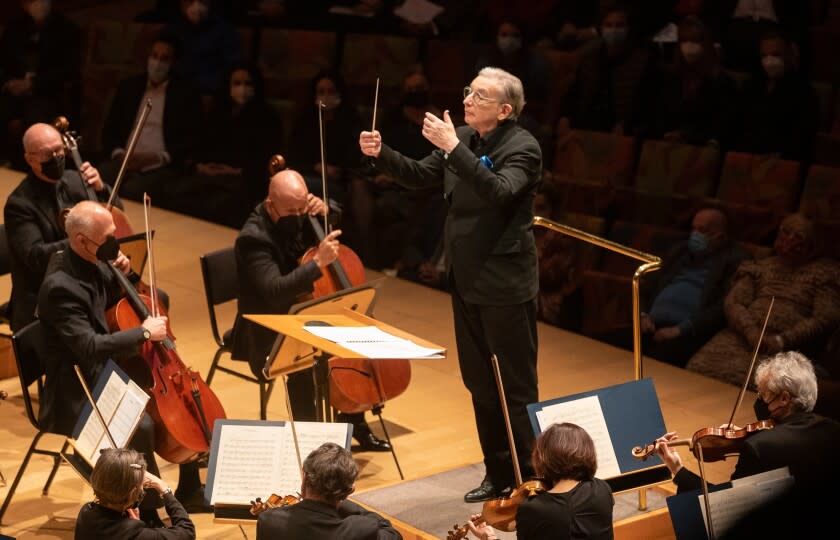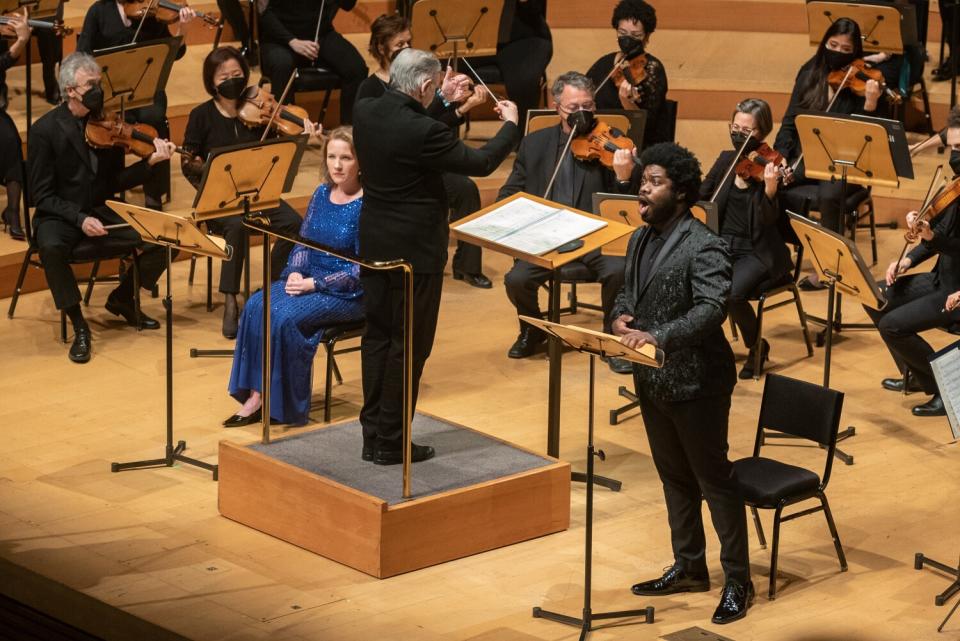Review: Back from brain surgery, Michael Tilson Thomas seeks transcendence with Rilke and the L.A. Phil

- Oops!Something went wrong.Please try again later.
In November, Michael Tilson Thomas reportedly received a hero’s welcome when he conducted the New York Philharmonic, his first public appearance since his surgery for a brain tumor four months earlier. Later that month, the audience was said to be ecstatic to see him again conduct the San Francisco Symphony, the orchestra he had led for 25 years and now serves as conductor laureate.
Friday night brought another emotional return. This time Tilson Thomas walked onstage at Walt Disney Concert Hall to lead the Los Angeles Philharmonic, his hometown band, the orchestra that met him as a brash, outrageously gifted prodigy some six decades ago.
The mood in Disney Hall was likely different from that in New York or San Francisco. We came not to see an icon but a family member, an eternal L.A. prodigal son. We came on the day L.A. County recorded 43,712 new cases of COVID-19.
Despite vaccination and mask requirements to attend Disney Hall, the risk level for the audience was hardly negligible. Attendance was spotty. Yet even taking into account that there were too few for MTT, as he is fondly known, to be welcomed with thunderous applause as he purposefully and masked walked onstage, the audience reaction was markedly muted. We needed an instant to believe that it was really him.
Ever the showman, MTT milked the moment. He turned to face the crowd and theatrically tore the mask off his face in a look-mom-it's-me-Michael gesture. It really was him, and rather than jump to its collective feet, the audience stood slowly, movingly. Some were in tears.
His first homecoming gift was Faure’s Pavane, an inconsequential orchestral lollipop. The orchestra was smallish, chamber sized.
Yet, Tilson Thomas made it wondrous. With the gracious ease of exacting gestures, he inspired instrument after instrument to ooze melodic lines like honey fresh from the hive. A beauteous pavane recalling the stately dance of yore served as not just bewitching but necessary (as we would later learn) prelude to consequential business at hand.
The two major works were Tilson Thomas’ own “Meditations on Rilke” — wistful reflections on life and death as the composer turned 75 in 2019 — and Prokofiev’s quasi-victory Fifth Symphony, elicitations on death and life as the Russian composer anticipated war’s end in 1944. Each proved monumental.
Speaking to the audience without a microphone and making himself excellently heard, Tilson Thomas described the inspiration for his “Meditations,” possibly his most important score to date, as coming from a story his father had once told him. The son of the famous Lower East Side Yiddish theater star, Boris Thomashefsky, Teddy Thomas had left New York to make a new life in the West with a new name. Driving across the country penniless, he stopped in Oatman, a former Gold Rush mining town in Arizona, where he got a job playing honky-tonk piano in a saloon to earn enough money to continue on to L.A.
“What? You’re from Oatman!” an astonished Tilson Thomas exclaimed addressing someone in the front rows and then becoming unusually speechless. It semi-spoiled his story, but he couldn’t have planned a more apt coincidence.
The “Meditations” are settings of a half dozen autumnal German-language Rilke poems for mezzo-soprano, baritone and small orchestra, in which one idea leads unexpectedly, weirdly and with the seeming incomparable consequence of chance. The first song, “Herbsttag,” (Autumn Day), is introduced by just that solo honky-tonk piano which elicits from the orchestra a response that might have come from an outtake to Mahler’s autumnal song cycle “Das Lied von Der Erde.” This turns into something out of, say, Alban Berg (both Mahler and Berg, it so happens, are on MTT’s second L.A. Phil program this week). Then wells up into something a tad Hollywoodish before the baritone finally solemnly sings, “Herr: es ist Zeit” (Lord: it is time).
The songs are about endings not beginnings. The autumn leaves are blowing. The last time Tilson Thomas was at the L.A. Phil, three years ago, he gave the local premiere of his “Four Preludes on Playthings of the Wind.” This riotous lollapalooza, which also took its beginnings from an L.A. remembrance, namely a party in Venice Beach 40 years earlier, opens with the Carl Sandburg line “The past is a bucket of ashes.”
We may never escape being playthings in the wind. In the end of the last Rilke song, “Herbst,” the leaves are falling, the Earth is falling from the stars, we are all ever falling, but gently into the hands of the One.
What Rilke, however, accomplishes in his poems, and what Tilson Thomas further improves upon theatrically and with no small debt to show business, is the transformation of alienation into amazement. These are somber songs. They look back — in one an imaginary life journey is from unselfconscious joy to a gasping for the breath of that early clear air (and this written just months before the pandemic!). They are a summing up. They need music that ranges widely.
Tilson Thomas’ wistfulness goes to the edge of sentimentality but stops just in time to make sure we do not feel cheated. The music is full of wit and mimicry. Tilson Thomas' songs may not sound like it, but they are, under it all, by the grandson of the “American Darling” of Yiddish theater, that meshuga mishmash of cultures where wisecracks and suffering are two sides of the same coin and where the worldly and the godly are two sides of a more valuable coin. Daringly playful, Tilson Thomas treats the fourth song, “Immer Wieder” (Again and Again) — an evocation of the mysterious, the terrifying silent abyss that awaits us as we lie down among flowers and face the sky — as “a Schubert cowboy song.”
Whatever lies ahead has allure, these “Meditations” promise, as they unflinchingly carry a listener along. The vocal lines have an irresistible songfulness that is at the core of all Tilson Thomas' music. In this case the mezzo-soprano Sasha Cooke and the baritone Ryan McKinny were muses, and they can be heard on MTT’s San Francisco Symphony recording of the premiere. For the L.A. Phil, he had the incisive Cooke, who made every word ring, and Dashon Burton, whose small baritone has a more generalized beauty, better at revealing awe than mystery.

With the Prokofiev Symphony, Tilson Thomas revealed nothing but awe. His tempos were very slow, the slowness of a shaman who could create a sense of overpowering immensity. The symphony, at times incredibly loud and often too heavy to move fast, became the whale that swallowed the listener. At one point near the end of the end, Tilson Thomas seemed to show fatigue, but he caught himself and in so doing only made the climactic ending all the more shockingly titanic.
Prokofiev meant for this symphony to capture the mood of a horrendous war not having sapped the spirit of his people at the moment Russia could foretell victory. There was suffering, but there was also still the beauty of the falling leaf, and now victory was at hand. This could almost be a musical road map of our own moment in the pandemic.
But through his incomparably crushing account, Tilson Thomas reminded us that there is war, always death and destruction, that, again, Lord, it is the time; that, again and again, the past is a bucket of ashes. Still, there is that perfectly shaped pearl of a pavane that, throughout it all, stays in the memory.
This was the first concert of the new year. Despite Mr. Omicron causing the need for more than the usual number of substitutes, or ringers, the L.A. Phil played like the orchestra's life depended upon making every note matter. Maybe, it did.
This story originally appeared in Los Angeles Times.

